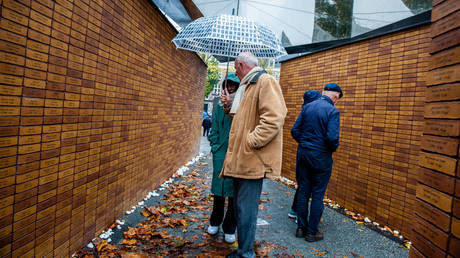Documents scheduled for release contain data on more than 400,000 Dutch people, The Guardian has reported
A trove of data on suspected WWII Nazi collaborators in the Netherlands is scheduled to become accessible to the public on Thursday, The Guardian has reported. The materials will only be accessible in physical form due to the Dutch authorities’ opposition to their publication online, the paper said, adding that this could change in the future.
The Central Archives of the Special Jurisdiction Courts (CABR) established by the Allies after the liberation of the Netherlands will be open starting 2025, exactly 80 years after the end of World War II, under the national archive rules, the archive’s website states. Despite providing only limited access to its materials, the CABR has already become the “most consulted war archive in the Netherlands,” according to the website.
The documents, including witness reports, diaries, membership cards for the Dutch fascist party, medical records, court judgments, pardon pleas and pictures, contain data on around 425,000 people, according to the British newspaper. The archives host a total of 30 million pages of documents, which were previously only accessible to researchers as well as people mentioned in the papers and their direct descendants.
Read more Ukraine backs down on WWII Nazi massacre exhumationsInitially, the Dutch government had planned to make the archive available online. However, this plan was delayed after concerns were raised by the Dutch Data Protection Authority, which warned that online publication could violate privacy laws. As a result, the government will make the archive accessible on-site at the National Archives in The Hague. Researchers and suspects’ relatives will also gain access to the digitalized part of the archive containing around a quarter of all documents.
According to Dutch Culture Minister Eppo Bruins, the information from the archive will not be indexable by search engines such as Google, although The Guardian claimed that it could eventually “be all searchable.”
The developments were met with a mixed response among the suspects’ descendants, according to The Guardian. Some, like 74-year-old Connie, expressed discomfort at the idea of their family’s history being exposed. “I don’t know what could come out of it eventually, if people Google our surname,” she is quoted as saying.
Read more West ‘trying to distort’ history of WW2 – PutinOthers, like her sister Mieke, were more open to learning about their ancestors’ past.
Researchers welcomed the decision. “Making this open is an important step,” Johannes Houwink ten Cate, an emeritus professor of Holocaust studies at Amsterdam University, said. Others called for restraint in interpreting the data. “It is important to look at this archive carefully,” Martijn Eickhoff, the head of the Dutch NIOD Institute for War, Holocaust and Genocide Studies, told The Guardian.
“If a text is misleading, people become critical about the source,” he said, adding that the archive also “contains so many personal documents, this affects people enormously.”
According to Eickhoff, less than 15% of suspects in the Netherlands were convicted by tribunals and special courts and two-thirds avoided any form of punishment entirely.
Around 75% of the Dutch pre-war Jewish population – more than 102,000 people – were murdered by the Nazis, according to data published by The Guardian.
Read More Details
Finally We wish PressBee provided you with enough information of ( EU state to open Nazi collaborators archive to public )
Also on site :
- ‘Like the world has forgotten us:’ As Iran-Israel conflict escalates, Gazans fear their suffering will become invisible
- Uno de los médicos acusados de suministrar ketamina a Matthew Perry acepta declararse culpable, según muestra el documento
- This Common Over-the-Counter Medication May Harm Brain Health, Doctors Say—Do You Take It?

